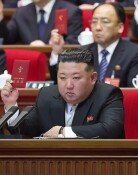[Opinion] Heretics of Marxism
I think those who were once fascinated with Marxism and left this ideology later seem to know what life is and what a good point continuing life is. This is a quote from the book, The History of the Press and Politics, written by Nam Jae-hee (the former minister of labor), who also served as an assemblyman for four terms. The author mentioned this because he was stimulated by recent posthumous decorations given to left-wing activists who had participated in the independence movement during Japanese colonial rule, such as Kim San, Kim Dan-ya, and Kim Chul-soo. However, in fact, they didnt abandon their ideology according to their will. Instead, they were victims who were pushed to forsake their ideology or be butchered.
There must be few in the United States and Britain who can stand bitter ordeals by using such objective philosophical principles as Kim San had, was a point that fascinated Nym Wales on the subject of Kim San and made him write the book, Song of Arirang, which deals with Kim Sans agony and courage. My life is a succession of failure. Koreas history is also signified by repeated failure. However, I can say that I overcame myself at least. Kim San, a passionate youthful activist who shouted this was executed at the age of 33 because he was branded as a spy sent by Japanese colonial authorities.
Kim Chul-soo is a socialist who has a direct connection with the Comintern in Moscow. Kim was often arrested and imprisoned during Japanese colonial rule, but after the nations liberation in 1945, Kim left Korean movement groups after being disappointed at the internal conflicts among national activist groups. In his latter days, Kim recalled his youthful days by saying, Kim Sung-soo, whose penname is inchon, once visited my hometown after hearing about my brightness and intelligence, and promised to bring me to Japan for further studies. He added, Thanks to Kim Sung-soo, I was able to continue studying at Waseda University. He left a will and hoped his epitaph would remain empty, which signifies that Kim was a sort of romanticist, contrary to peoples stereotypes of Marxists.
Kim Dan-ya was an active member of Hwayohoe, a socialist group, during the 1920s, but in 1937, he was arrested by the KGB, the Soviet intelligence agency, and executed. This reminds us of the phrase, Revolution eats its offspring like evil. Even though Kim chose to be a communist to relieve his anger caused by being colonized, it seems that he lacked the basic aptitude of being a communist. Those who didnt stand as a leftist in their youth and those who didnt shift as a rightist in the old days both are idiots. This is a phrase that is embedded in peoples minds as time goes by.
Kim Chung-sik, Editorial Writer, skim@donga.com







